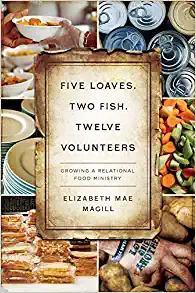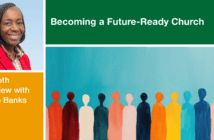Elizabeth Mae Magill sought to create a food ministry that wasn’t a charity but a demonstration of Christ’s radical welcome. She did months of street ministry to get to know food insecure neighbors, hear their stories, and build relationships. She shares nine practical tips for meeting people and learning their needs.
Street ministry is simply walking around in areas where people are hanging out, inviting people into conversation where they are. Here are some things we learned through our experience.
1. Ask for advice.
Local service providers will know where to start your street walking. As you build relationships you can ask the people you meet where else you might go. I found people eager to share where I might meet more people — and also careful to advise me about more dangerous locations.
2. Travel in pairs.
Don’t engage in street ministry alone. (Jesus sent out the disciples two by two.) However, large groups of volunteers can be intimidating to those you’re trying to reach. A pair or trio of people is adequate. My co-pastor and I always did our street ministry during daylight hours to avoid being in the more dangerous areas of town at night.
3. Bring items to give away.
My co-pastor and I carried new white socks to hand out to those we saw on the street. We found that carrying a small gift (soft granola bars or sandwiches would also work) made starting a conversation easier. At the beginning, our interactions were awkward. We couldn’t tell who was food insecure just by looking at them, but we greeted people and asked them if they wanted socks. Note that desiring socks is common for people who are homeless, but food is better for identifying people who are food insecure.
4. But don’t bring too much.
Avoid giving away too much stuff. Identify what will help start conversations and don’t bring more than that. You can’t build a relationship when you hold the strings on material resources. If your church has a thrift shop, meal, or food pantry, certainly refer people to those resources or to those at other churches. We didn’t have financial resources, so we could honestly say, “What we have to offer is prayer.” We also might add, “God loves you the way you are and wants you to have what you need.” If you have the time, you can offer to go with someone to get resources. In any case, follow up the next time you see them. It will feel awkward to not meet every person’s need — and that feeling gets worse as you get to know people better. But once you are the source of stuff, it will be more difficult to build a real relationship.
5. Find a meal to visit.
Early on, one of the people we met suggested we visit the local Salvation Army. In our city, they have meals every weekday. After that, my co-pastor and I walked our usual route and attended a meal at the Salvation Army each week. In terms of talking to people, I found the meal easier because it gave me the opportunity to ask questions: “Is this the right place to stand in line?”, “Where is the coffee?”, “Where do I put my dirty dishes?”, and “Is the soup good?” Of course, eventually I knew the answer to those questions, but I could still ask, “Can I sit next to you?” as an icebreaker for further conversation.
6. Allow time for building trust.
Finding people and making small talk will take more time than you expect. We went out once a week for six weeks before we invited people to lunch and worship on Christmas Day — and no one came. It was several months later that we tried again on the following Easter. That time we had 12 people commit to doing a specific task and six of those people showed up.
7. Develop a routine.
Once you have identified good places to visit, make it a routine. It is best if the same people can visit almost every week. You want to get to the state where you come in and people recognize that you belong in that space. As you get to know people, the conversations will change. Ask about how they are, and about things people told you about the week before. Some people like to bring a list of resources available, although I found that people on the streets knew the details of these programs better than I did. It is helpful to know any news about shelters, food stamps, difficult landlords, and health service organizations.
8. Hold stories in confidence.
Eventually someone will begin to tell you their story. Hold that story in confidence, telling only your supervisor for this work and only if you need advice on how to handle the situation. Also hold the stories you are told lightly. Remember, our system rewards people who tell good stories. Listen for the underlying feelings. Ask questions that don’t doubt the story or require them to defend themselves, but rather get at how they feel, what they will do next, how you can hold them in prayer.
9. Check in on fellow volunteers.
My co-pastor and I ended each session of street ministry by checking in with each other and with all the volunteers who had gone out with us. She and I shared information that could be helpful to our ministry, though we only shared an individual’s specific story if we needed advice for the next time. We both took the opportunity to name what had been hard in our conversations and relationship building that day and to think through what we might do differently next time.
Meeting with people we wanted to serve and spending time listening to their stories was difficult, exhausting work, but it was work that got easier over time. As my co-pastor and I got to know the people in our community, they began introducing us to others, and we started to feel like we belonged. The key is to stick to it, even during the weeks when we feel like nothing significant is happening. Some people may never want to share their lives and stories with us, and that can be disappointing. Many will appreciate the time we take to listen to them, to check in on them, and ultimately to create a relationship with them.
 This article is excerpted from Five Loaves, Two Fish, Twelve Volunteers: Growing a Relational Food Ministry by Elizabeth Mae Magill (www.elizabethmaemagill.com). Copyright © 2020. Used by permission of Upper Room Books. To purchase the book, visit https://upperroombooks.com/book/five-loaves-two-fish-twelve-volunteers/ or call (800) 972-0433. The book is also available at Cokesbury and Amazon.
This article is excerpted from Five Loaves, Two Fish, Twelve Volunteers: Growing a Relational Food Ministry by Elizabeth Mae Magill (www.elizabethmaemagill.com). Copyright © 2020. Used by permission of Upper Room Books. To purchase the book, visit https://upperroombooks.com/book/five-loaves-two-fish-twelve-volunteers/ or call (800) 972-0433. The book is also available at Cokesbury and Amazon.
Related Resources
- Doing Good Well Video Tool Kit
- Worship Under the Bridge by Robert Schnase
- How a Food Pantry Became So Much More by Kevin G. Harney






